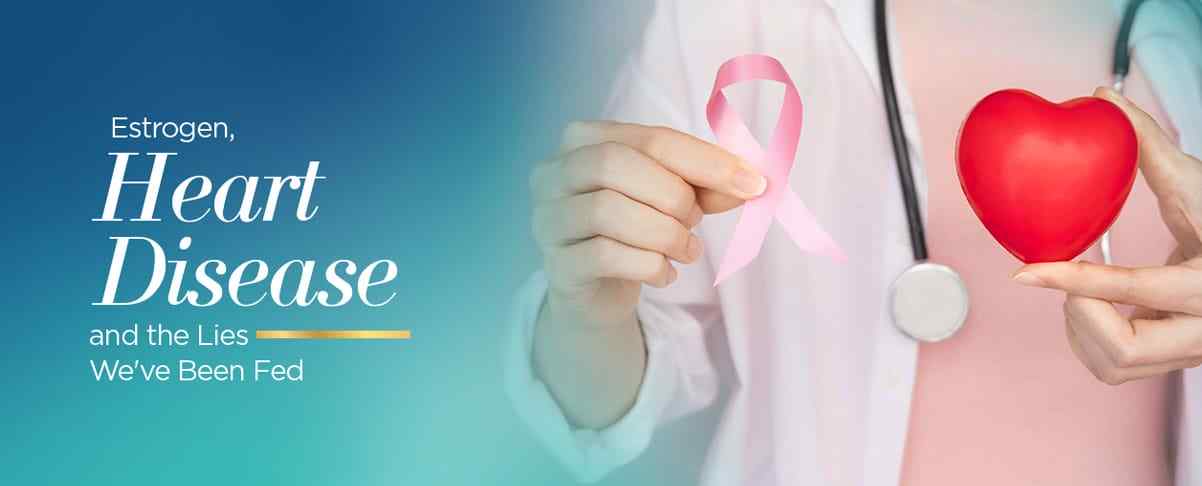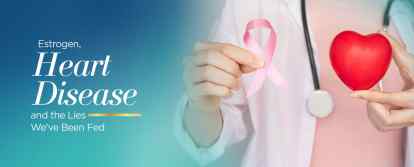Protecting Your Heart with Estrogen without the Fear of Breast Cancer

For women, it is no secret that estrogen plays a major role in how their body functions. Females go through life with the understanding that one day, their natural estrogen levels will decline, their reproductive years will be over due to menopause, and certain body changes are to be expected. However, declining estrogen levels can bring about so many worrisome risks as well, including risks for the heart. Hormone replacement therapy (HRT) may thwart some of those risks for the heart and secondarily reduce the risks of breast cancer.
Unfortunately, misinformation about hormone replacement therapy and heart disease and breast cancer risks has been relatively prevalent over the last few decades. Not only should women not be afraid of HRT because of misunderstood risks of breast cancer, but HRT can also be a powerful way to protect women from heart disease.

Even though the fact is not widely known, heart disease is actually the number one cause of death among women in the United States. Approximately every 80 seconds, a woman loses her life due to complications from heart disease, and one in three women has some type of heart disease. Cardiovascular disease (CVD) actually takes more female lives in our country than all types of cancer combined. Most importantly, 80 percent of CVD cases may be preventable.
The Risks for Women vs Men
Historically, heart disease has been more associated with the male population, which meant much of the research done involved male study subjects. However, heart disease in women is just as common, but the disease does not always present the same way or involve the same risk factors. Some of the biggest risk factors for heart disease are even more prevalent in the female population:
Obesity
Women are more at risk of being obese, especially before and during menopause
Diabetes
Diabetic women are two times more likely to develop CVD than men
Smoking
Female smokers are more likely to have a heart problem than men who smoke
Metabolic syndrome
Women with metabolic syndrome tend to have heart attacks earlier in life than men
Taking birth control
Birth control increases the risk of both stroke and heart attack in women
Low estrogen levels
The risk of heart disease increases exponentially when estrogen levels start to drop
While scientific researchers have focused on how heart-healthy estrogen can be for the heart for years, the true complexity of and profound role estrogen plays in heart health has only recently taken center stage. Current research has actually pointed out that a certain area of heart tissue may produce estrogen, and that estrogen seems to play a role in primary heart functions, such as:
-
Relaxing and dilating blood vessels to encourage blood flow
-
Absorbing free radicals that can be damaging to the cardiovascular system
-
Promoting blood clot formation after an injury
When a woman experiences a drop in estrogen levels, associated with menopause or otherwise, harmful LDL cholesterol levels go up and HDL cholesterol levels go down. This leads to a heightened accumulation of cholesterol and fat within the arteries, which in turn means a bigger risk for stroke, heart attack, and CVD. So, in addition to the heart missing out on a valuable component that it needs to function well, lacking estrogen may directly cause problems for the heart.
HRT, especially certain forms, may deliver some pretty impressive advantages when it comes to women and the health of their hearts. Therefore, you would expect that pretty much all women would be taking HRT to lower their risks of heart disease as they approach menopause or once they are going through the change. However, some earlier studies of HRT caused a great deal of confusion, especially in terms of risks to the heart.
Over 20 years ago, a study referred to as the Women's Health Initiative (WHI) set forth to determine the risks associated with HRT. The study was actually stopped before completion with the rumor that researchers found that HRT seemed to heighten the risks of both heart attack and breast cancer. Later, however, lead researchers stated that the study itself was flawed, news reports after the study were distorted, and the actual findings were that synthetic forms of HRT may have increased instances of blood clots and hip fractures.
In reality, HRT can be a tailored effort with a specific selection of hormones to truly target the physiological needs of the woman being treated. When this individualized effort is taken, the risks of detrimental outcomes or heightened risks for heart disease are substantially lower if not obsolete. Outcomes can also vary depending on the type of HRT used. For example, the risks with bioidentical hormones and heart disease are much lower than with synthetic hormone replacement, just as risks of breast cancer are thought to be lower with bioidentical HRT.
Timing with HRT Could Be Especially Important
One big question medical professionals are starting to examine with HRT is when should HRT be initiated for the best possible outcome? The ruling hypothesis in scientific communities is that age of initiation with HRT could have everything to do with how well risks of heart disease are mediated.
In general, HRT is considered to be most effective when given within 10 years of when menopause starts, or in women who are less than 60 years old. But, even more noteworthy, CHD events seem to be reduced in women with earlier intervention treatment with HRT. A large-scale meta-analysis of nearly 40,000 women found that early initiation of hormone replacement therapy significantly reduced CHD risks and the risk of death due to cardiac events.
With the combination of more customized HRT and the precisely right timing for the female patient, optimal outcomes could be more likely. The woman may not only get the benefits of negating some of the most uncomfortable symptoms of estrogen decline, but also reap the long-term advantage of lowered risks of heart disease.
Just as the dated WHI study led to unwarranted concerns about heart disease, the same study led to misunderstandings about HRT and breast cancer risks. The study unfairly lumped together multiple types of hormone replacement, including synthetic and bioidentical hormones. Further examinations found that women who were taking bioidentical hormones after a hysterectomy actually had a 21 percent lower risk of breast cancer. To date, numerous other studies have shown that breast cancer is more relative to other risk factors than hormone replacement, and only synthetic hormones and progestins may be more to blame for heightened breast cancer risks.
The risk of breast cancer may actually be bigger for women who don't seek HRT due to both estrogen decline and symptoms associated with low estrogen. Low hormone levels can lead to a number of problems that are directly associated with breast cancer. A few examples include sleep disturbances and depression, both of which are highly related to low estrogen levels during menopause. In fact, lack of good quality sleep can mean a bigger risk for some of the most aggressive forms of breast cancer, and depression may heighten risks of breast cancer recurrence by as much as 24 percent!
HRT can definitely be beneficial for women for all kinds of reasons, but HRT is also not the right treatment for every woman. The most suitable patients are younger when estrogen levels are just starting to decline. In other words, a woman seeking HRT for the most effective outcomes should seek treatment early before low estrogen levels have already started to bring about undesirable symptoms like high cholesterol levels. All women should openly discuss low estrogen levels and the plausibility of HRT with their doctor, especially in terms of what HRT could mean for their cardiovascular health.
Over the years, HRT has been largely associated with negative perceptions in regard to cardiovascular health and the risks of cancer. However, the in-depth research that has taken place in the last few years has shed new light on a treatment that clearly has health advantages for women. When given at an appropriate time, and formulated to deliver what the patient's body actually needs, HRT could enable women to experience a longer life without unnecessary concerns about heart disease or even breast cancer.
If you would like to know more about HRT options available and heart disease, reach out to a pharmacist at Harbor Compounding Pharmacy to get the facts.



